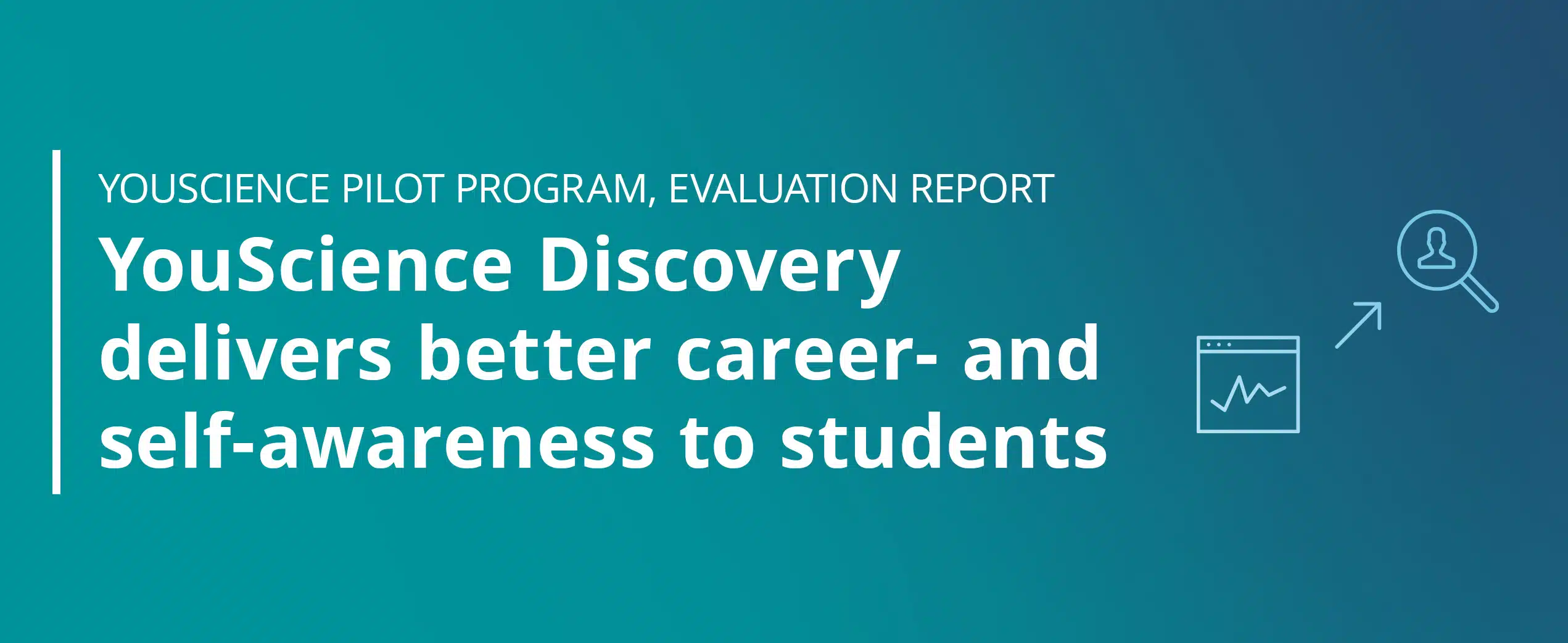Pilot shows that high school students who know their aptitudes are better prepared to make decisions about their educations and careers.
If high school students know their aptitudes, do they apply them in choosing education and career pathways? That’s the question The Georgia Governor’s Office of Student Achievement (GOSA) set out to answer in a statewide pilot of YouScience Discovery in Georgia high schools.
The evaluation concluded that, yes, when students use YouScience Discover to find their natural abilities to learn or perform in given areas, they use that knowledge in picking their career and education pathways. That’s especially true when they spend 20 or more minutes reviewing their results.
Those findings led GOSA and the Technical College System of Georgia to make YouScience Discovery available to all Georgia public middle and high schools as well 22 technical colleges starting in 2016. A summary of pilot results is included here.
Goals
Georgia State Senator Lindsey Tippins outlines the goal the pilot targets, which is to identify an online profile to help Georgia high school students discover and apply their aptitudes to education pathway and career choices. The profile chosen for the pilot was YouScience Discovery.
Major findings
Pilot results show that YouScience Discovery is effective in improving students’ attitudes toward career decisions. It finds that YouScience Discovery has the largest impact on students’ ability to describe their natural talents and identify careers that align with their aptitudes — their self-awareness.
The pilot found that after taking Discovery, students are significantly:
- Better at describing their natural abilities and identifying suitable careers for themselves (self-awareness).
- More confident in making informed career decisions (career decision-making)
- More empowered to follow their future paths (self-empowerment)
- More likely to explore careers (career exploration)
- More inclined to go after a career pathway and/or additional postsecondary education or training (intent to persist)
Overall, the evaluation of the YouScience Discovery pilot study shows that students demonstrate improvements in their attitudes toward self and career after taking Discovery. Gains are most pronounced among female students with free and reduced priced meal eligibility and students who spend at least 20 minutes reviewing their Discovery results.
The takeaway? YouScience Discovery works and is particularly valuable for financially disadvantaged female students and when students and teachers spend time interacting with student results.
“Before I completed YouScience, I had no idea what I wanted to do, or what jobs are out there. Now I know not only real jobs that are waiting for me, but I know which jobs are most likely to be the best fit for me. I don’t yet know what I want to do, but I do know that YouScience has helped me and when it comes time for me to pick a job, it will be easier for me ….”
— Student Survey Respondent
About the pilot
To pilot was done by GOSA, which subcontracted with SageFox Consulting Group to administer and analyze the program and its findings.
More than 8,000 10th graders at 51 Georgia high schools and at least one high school from each of the 16 regional educational service agencies (RESA) are included. Schools in both urban and rural areas are included to reflect the statewide population. The distribution also ensures that the percentage of students with free and reduced price meal eligibility in the pilot was comparable to those eligible statewide.
The pilot evaluates three key areas:
- To what extent does taking YouScience Discovery broaden students’ vision or awareness of career pathways?
- Are students more willing to engage in a career pathway because of their YouScience Discovery results?
- To what extent does YouScience Discovery add to students’ college and career readiness?
Three data sources are used for each evaluation area: a student survey to gauge perceptions and measure attitudinal growth; an ambassador survey to understand implementation; and state administrative data to understand student demographics. Ambassadors are representatives at each school tasked to help implement the pilot.
Find the full 2016 YouScience Pilot Program, Evaluation Report online, which included full details and a statistical analysis of the pilot.
To learn more about aptitude-based career guidance, Contact YouScience.

